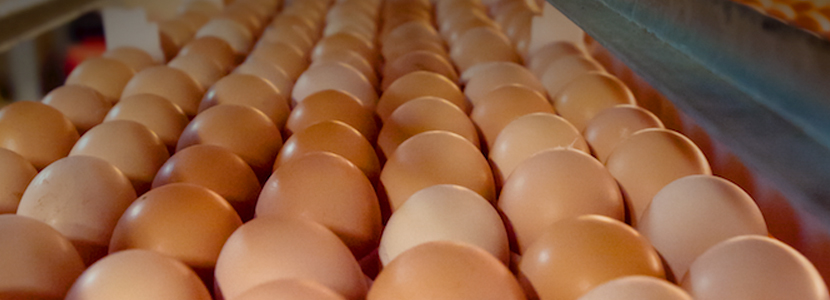Content available at: Español (Spanish)
In the world of broiler incubators, one of the terms that have appeared in recent years is the S.P.I.D.E.S., whose meaning is: Short Period Incubation During Egg Storage.
The first news that referred to the S.P.I.D.E.S. are dated 2012. Different specialists showed that using the S.P.I.D.E.S technique improved the hatchability of eggs stored for long periods.
What is the S.P.I.D.E.S. process?
This process involves in its original idea a decrease in the loss of fertility in flocks with a storage period of more than seven days.
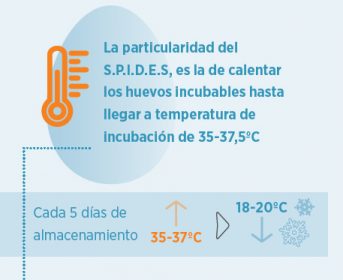
The operation’s success lies in the ability to lower the temperature as quickly as possible until it reaches the storage temperature of 18-20ºC. It is advisable to carry out these processes every five days of storage.
In incubators that do not have specific machines to carry out the operations necessary to carry out these particular processes, empty incubators can be used as alternatives.
It is crucial to control and report the evolution of the eggshell temperature at all times, for which the use of contact thermometers, loggers, or thermographic images is advisable.
How is a correct execution pattern of the S.P.I.D.E.S. carried out?
Take a cart from the storage room and preheat it until it reaches 25-27ºC.
It is important to control all the trays to ensure optimal practice.
Once all the trays have been tested, the temperature should be raised to 35-37ºC, carrying out a detailed control of all the trays.
This part of the practice is the most critical. Once its totality has reached the temperature of consignment, let’s carry out the cooling as quickly as possible in the eggs.
It is important to be careful not to subject the cart to very strong currents, if it is taken directly to the conservation room, not to leave it near carts that are already in said room, so as not to cause heating of the eggs that previously remained in the room.
If the SPIDES operation is performed correctly, the results in terms of fertility are pretty remarkable.
SPIDES application in broiler incubator
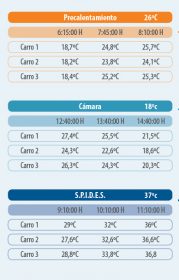
A “Ross 308” flock was chosen, with 39 weeks of age. Each of the groups had a total of 15,840 eggs.
The flock was divided into three different groups:
- Group 1: 3 days of conservation in the chamber + 3 days of setting date: 6 days
- Group 2: 5 days of storage in the chamber + 4 days laying date: 9 days
- Group 3: Identical characteristics as group 2, performing a S.P.I.D.E.S, five days after the set date.
The temperature report of the three cars at the time of the S.P.I.D.E.S. showed the following data and graphs.
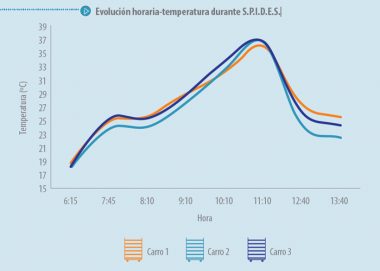
The second part of the SPIDES application study in a broiler incubator was carried out by recording a hatching campaign for each of the groups.
The incubation process was developed using an existing incubator model on the market*.
The incubation process lasted 510 hours.
The first control was carried out 30 hours before the extraction of the chicks from the hatchers. Counting was repeated every 6 hours until the moment of birth.
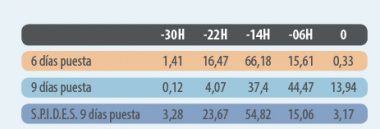
The graphs show substantial differences, being very remarkable the similarities between Group 1 (eggs 6 days) and Group 3, S.P.I.D.E.S. The least advisable curve is Group 2 (eggs 9 days).
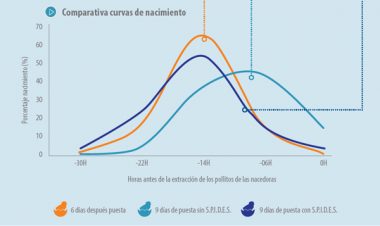
A chick quality control was carried out, showing few differences between Group 1 and Group 3.
Not so in Group 2, the presence of 13% of the chick still wet at the time of hatching, reported the presence of poorly closed navels, and the activity level of the chick was below Group 1 and Group 3.
* Chick Master 165 Genesis III machine.
Hatching
At birth, the results of the three groups were as follows:
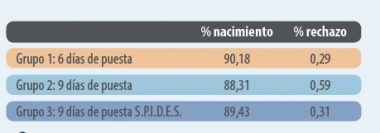
Group 1: 3 days of storage in the chamber + 3 days of setting date: 6 days.
Total: 15,840 eggs, 14,285 hatched chicks, 90.18% and 0.29% reject chicks.
Group 2: 5 days of storage in the chamber + 4 days laying date: 9 days.
Total: 15,840 eggs, 13,989 hatched chicks, 88.31% and 0.59% reject chicks.
Group 3: Identical characteristics as group 2, performing a S.P.I.D.E.S, 5 days after the set date.
Total: 15,840 eggs, 14,166 hatched chicks, 89.43% and 0.31% reject chicks.
The results of the test show the foundation of the S.P.I.D.E.S. theory. A correct execution not only improves fertility, but the improvement in the quality of the chick is even more notable, with a decrease in the hours in the hatching bell and, in turn, a lower appearance of reject chicks. As an important note, using the S.P.I.D.E.S technique improves the homogenization of chicks from batches with storage greater than 7 days.
